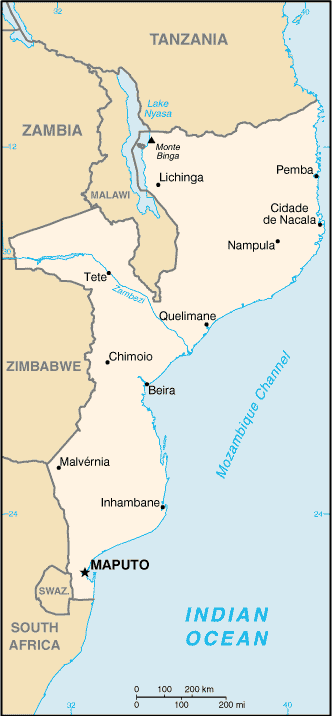| Mozambique
Map Courtesy CIA World Factbook
Mozambique's first inhabitants were San hunters and gatherers, ancestors of the Khoisani peoples. Between the first and fourth centuries AD, waves of Bantu-speaking peoples migrated from the north through the Zambezi River valley and then gradually into the plateau and coastal areas. The Bantu were farmers and ironworkers. When Portuguese explorers reached Mozambique in 1498, Arab-trading settlements had existed along the coast and outlying islands for several centuries. From about 1500, Portuguese trading posts and forts became regular ports of call on the new route to the east. Later, traders and prospectors penetrated the interior regions seeking gold and slaves. Although Portuguese influence gradually expanded, its power was limited and exercised through individual settlers who were granted extensive autonomy. As a result, investment lagged while Lisbon devoted itself to the more lucrative trade with India and the Far East and to the colonization of Brazil. By the early 20th century the Portuguese had shifted the administration of much of Mozambique to large private companies, controlled and financed mostly by the British, which established railroad lines to neighboring countries and supplied cheap--often forced--African labor to the mines and plantations of the nearby British colonies and South Africa. Because policies were designed to benefit white settlers and the Portuguese homeland, little attention was paid to Mozambique's national integration, its economic infrastructure, or the skills of its population. After World War II, while many European nations were granting independence to their colonies, Portugal clung to the concept that Mozambique and other Portuguese possessions were overseas provinces of the mother country, and emigration to the colonies soared. Mozambique's Portuguese population at the time of independence was about 250,000. The drive for Mozambican independence developed apace, and in 1962 several anti-colonial political groups formed the Front for the Liberation of Mozambique (FRELIMO), which initiated an armed campaign against Portuguese colonial rule in September 1964. After 10 years of sporadic warfare and major political changes in Portugal, Mozambique became independent on June 25, 1975. The last 30 years of Mozambique's history have reflected political developments elsewhere in the 20th century. Following the April 1974 coup in Lisbon, Portuguese colonialism collapsed. In Mozambique, the military decision to withdraw occurred within the context of a decade of armed anti-colonial struggle, initially led by American-educated Eduardo Mondlane, who was assassinated in 1969. When independence was achieved in 1975, the leaders of FRELIMO's military campaign rapidly established a one-party state allied to the Soviet bloc and outlawed rival political activity. FRELIMO eliminated political pluralism, religious educational institutions, and the role of traditional authorities. His successor, Joaquim Chissano, continued the reforms and began peace talks with RENAMO. The new constitution enacted in 1990 provided for a multi-party political system, market-based economy, and free elections. The civil war ended in October 1992 with the Rome General Peace Accords. Under supervision of the ONUMOZ peacekeeping force of the United Nations, peace returned to Mozambique. By mid-1995 the more than 1.7 million Mozambican refugees who had sought asylum in neighboring Malawi, Zimbabwe, Swaziland, Zambia, Tanzania, and South Africa as a result of war and drought had returned, as part of the largest repatriation witnessed in Sub-Saharan Africa. Additionally, a further estimated 4 million internally displaced returned to their areas of origin.
|
||||||||||||||||
 Mozambique is a country in Southern Africa, bordering South Africa, Swaziland, Tanzania, Malawi, Zambia and Zimbabwe. The Comoros lie offshore to the northeast and Madagascar lies across the Mozambique Channel. It is a member of the Community of Portuguese Language Countries and the Commonwealth of Nations. Its capital and largest city is Maputo, located in the southern edge of the country.
Mozambique is a country in Southern Africa, bordering South Africa, Swaziland, Tanzania, Malawi, Zambia and Zimbabwe. The Comoros lie offshore to the northeast and Madagascar lies across the Mozambique Channel. It is a member of the Community of Portuguese Language Countries and the Commonwealth of Nations. Its capital and largest city is Maputo, located in the southern edge of the country.